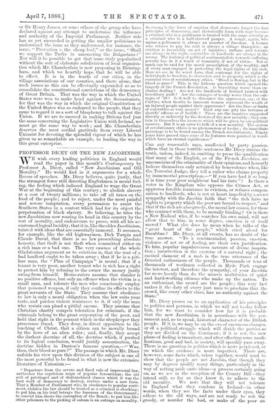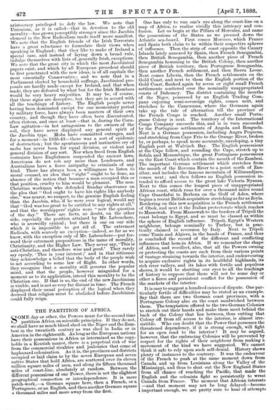PROFESSOR DICEY ON THE NEW JACOBINISM.
literature of Unionism :— " Departure from the severe and fixed rule of impersonal law, enthrones the capricious reign of popular favouritism; the old evil of privileged and of disfranchised classes which it was the best work of democracy to destroy, revives under a new form. That a Member of Parliament who, in obedience to popular senti- ment, violates the law should be treated as a criminal is shocking ; to put him on his trial betrays the baseness of the Government; to convict him shows the corruption of the Bench ; to put him like other prisoners to the picking of oakum is an outrage on morality.
So strong is the force of emotion that democrats forget the first principles of democracy, and rhetorically foam with rage because a criminal who is a gentleman is treated with the same severity as a criminal who is a half-starved pauper. A rough, again, who maims a policeman is always an asserter of freedom. A farmer who refuses to pay his rent is always a village Ilampden ; an eviction is invariably an act of injustice; ruffians and tenants are always in the right, constables or landlords are always in the wrong. The leniency of political sentimentalists towards suffering poverty has in it a touch of humanity, if not of virtue. Not so much can be said for the moral proscription of the wealthy, and of every man engaged in protecting the legal rights of the rich. Here we see, in its worst form, that contempt for the rights of individuals to freedom, to character, and to property, which is the essential vice of revolutionary ethics. Blood is flowing, but is the blood so pure ?' This is the hideous question which opened the tragedy of the French Revolution. Is boycotting worse than ex- clusive dealing ? Are not the landlords of Ireland tainted with hereditary guilt ? Are the outrages of to-day worse than the out- rages of '98? Is it well to denounce the oppression, say, of the Curtins, when insults to innocent women represent the wrath of an injured people against their oppressors ? Are the lives or limbs of constables so very sacred ? Need any one pity the tortures of sheriffs' officers or of bailiffs ? These are the inquiries suggested directly or indirectly by the doctors of the new morality ; they con- tain in themselves the answers which will be given by our political casuists. But it is an error to talk of a new morality. The system of revolutionary ethics is no phenomenon of to-day ; its immediate parentage is to be found among the French revolutionists. Ninety years have passed since some of its features were painted in words which have an eternal significance."
Can any reasonable man, unaffected by party passion, affirm that in those terrible sentences Mr. Dicey strains the truth, unless, indeed, in omitting to press the qualification that many of the English, as of the French Jacobins, are unconscious of the criminality of their opinions, and honestly believe themselves only actuated by benevolence when, like the Terrorist Judge, they tell a suitor who claims property by immemorial prescription,—" If you have had it so long, it is time your poor neighbour had his turn " ? Is there a voter in the Kingdom who opposes the Crimes Act, or approves forcible resistance to eviction, or refuses compen- sation to landlords, who is not at heart impelled by a secret sympathy with the Jacobin faith that "the rich have no rights to property which the poor are bound to respect," and that if the rich are also greedy, the moral law ceases, for those who contract with them, to be morally binding ? Or is there a New Radical who, if he searches his own mind, will not allow that to him, in some degree, emotion is of itself sacred ? What else does he mean when he talks of the "great heart of the people," which cried aloud for Barabbas ? Mr. Dicey, at all events, has no doubt of the true answer. "To a sentimentalist, passion, emotion, violence of act or of feeling, are their own justification. To him, popular impulsiveness savours of divine inspira- tion; insurrection is the exercise of a natural right ; the excited clamour of a mob is the true utterance of the frenzied enthusiasm of the people. Thousands or tens of thousands of workmen collected in Hyde Park engage the interest, and therefore the sympathy, of your Jacobin far more keenly than do the unseen multitudes of quiet and hard-working citizens who make up the nation. To an enthusiast, the crowd are the people ; this very fact makes it the duty of every just man to proclaim that the crowd, like every other class, has no authority against the State."
Mr. Dicey passes on to an application of his principles to politics and persons, in which we will not to-day follow him, for we want to consider how far it is probable that the new Jacobinism is in accordance with the per- manent and, so to speak, historical character of the British people. If it is, we may be on the eve of enormous changes, or of a political struggle which will divide the parties as they are divided on the Continent ; if it is not, the new phase of feeling is transitory, and after effecting some modi- fications, good and bad, in society, will speedily pass away. There is no question in politics which is more perplexed, or on which the evidence is more imperfect. There are, however, some facts which, taken together, would tend to show that the people are not Jacobin, that though they may by degrees modify many things, particularly in the way of setting aside caste ideas—a process certainly going on, as we see in the reception of the County Bill—they intend still, so far as they know it, to adhere to the old morality. We note that they will not tolerate in England what they condone in Ireland—in other words, when they see the facts under their eyes, they adhere to the old ways, and are not ready to rob the greedy, or murder the bad, or make of the poor an' aristocracy privileged to defy the law. We note that Unionism, as it is called—that is, devotion to the old morality—has grown perceptibly stronger since the Jacobin element in the New Radicalism made itself more manifest. We note that the English friends of the Irish Terrorists have a great reluctance to formulate their views when speaking in England ; that they like to make of Ireland a special case, and instead of laying down a broad rule, indulge themselves with lists of, generally Irish, exceptions. We note that the great city in which the most Jacobinical papers exist, and which by all European precedent should be first penetrated with the new ideas, is of all capitals the most essentially Conservative ; and we note that in a Parliament elected by household suffrage, Jacobinical pro- posals are hardly made except for Ireland, and that when made, they are defeated by what but for the Irish Members would be very heavy majorities. It may be, of course, that these signs are deceptive, but they are in accord with all the teachings of history. The English people never having been dominated except for one momentary period by military force, have always been masters of their own country, and though they have often been discontented, often riotous, and once at least—that is, during the Corn- Law agitation—in hot antagonism to the owners of the soil, they have never displayed any general spirit of the Jacobin type. Mobs have committed outrages, and for a moment—in 1838-43—there was a sort of epidemic of destruction ; but the spontaneous and instinctive cry of mobs has never been for equal division, or violent and general division of any sort. Nor when freed from English restraints have Englishmen suspended the ancient laws. Americans do not rob any more than Londoners, and Australians have a fierce antipathy to criminals of any kind. There has always been a willingness to listen to moral counsel, an idea that " right " ought to be done, an absence of the notion that because a man occupied this or that position, cruelty to him would be pleasant. The non- Christian workman who defended Sunday observance on the plea that "God ought to have his rights like anybody else," was nearer, we suspect, to the genuine English feeling than the Jacobin, who, if he were ever logical, would say that" God was too great to be entitled to any rights at all," and that the worshippers' rights were "now the question of the day." There are facts, no doubt, on the other side, especially the position attained by Mr. Labouchere, who is avowedly cynical ; but there is one on our side which it is impossible to get rid of. The extremest Radicals, with scarcely an exception—indeed, so far as we know, with the exception only of Mr. Labouchere—put for- ward their extremest propositions in the name of morality, Christianity, and the Higher Law. They never say, This is anti-Christian, and therefore wise and good.' They rarely say openly, 'This is your interest ;' and in that reticence they acknowledge a belief that the body of the people wish to act according to some law of Right. In other words, they recognise that a morality still governs the popular mind, and that the people, however misguided for a moment as to its application, intend this morality to be the Christian one. If that is so, the end of the new Jacobinism is visible, and is not so very far distant in time. The French displayed their usual perception of the logical when they decreed that religion must be abolished before Jacobinism .could fully reign.



































 Previous page
Previous page